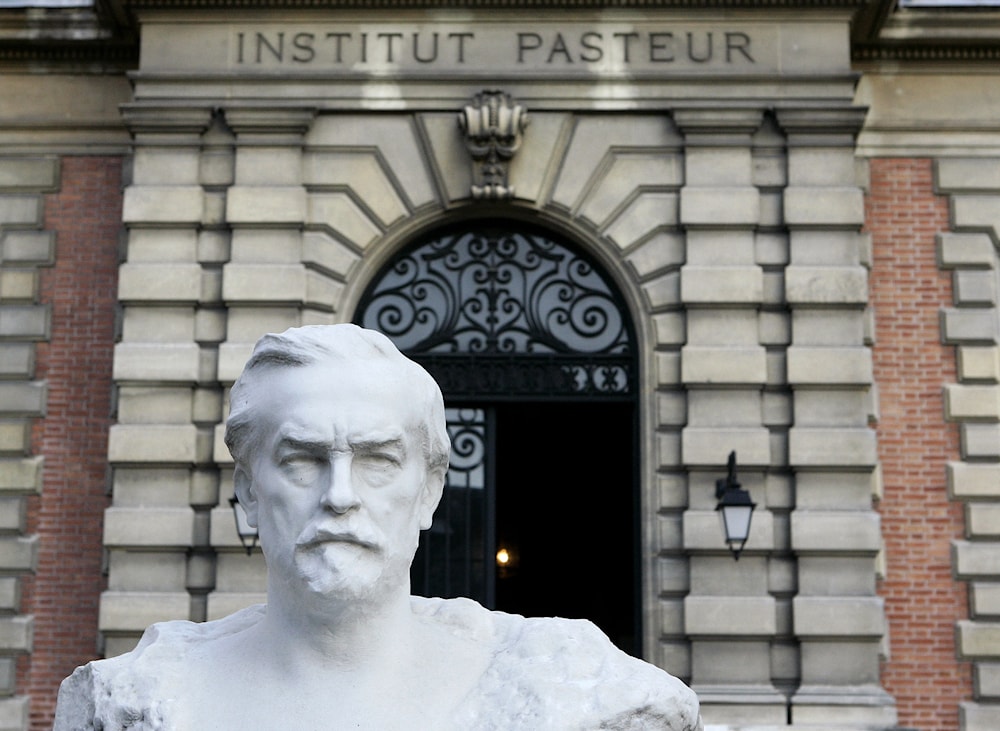Scientific asylum: European colleges taking in fleeing US researchers
US academics seeking to avoid funding cuts and ideological restrictions are being actively recruited in Europe.
-

A statue of Louis Pasteur (1822-1895) stands in front of the Pasteur Institute building in Paris, Thursday, Oct. 27, 2005 (AP)
A job advertisement from Belgium stood out with terms like “censorship” and “political interference", making it clear who its target audience was: US researchers seeking refuge from funding freezes, budget cuts, and ideological restrictions imposed by Donald Trump’s administration, The Guardian reported.
The ad’s emphasis on academic freedom underscored its appeal to those looking for a way out.
“We see it as our duty to come to the aid of our American colleagues,” said Jan Danckaert, rector of Vrije Universiteit Brussel (VUB). Founded in 1834 to protect academia from state and religious interference, the university has now opened 12 postdoctoral positions specifically for international researchers, with a particular focus on Americans.
“American universities and their researchers are the biggest victims of this political and ideological interference,” Danckaert told The Guardian.
“They’re seeing millions in research funding disappear for ideological reasons,” Danckaert stressed.
VUB is one of several European institutions actively recruiting US researchers, positioning itself as a haven for those looking to escape the tightening grip of Trump’s administration on research and higher education.
Wider context
Since Trump took office, American researchers have faced a multifaceted crackdown. Government budget cuts have put thousands of jobs at risk at agencies like NASA, the Centers for Disease Control and Prevention (CDC), and the National Oceanic and Atmospheric Administration (NOAA), the US premier climate research body. Simultaneously, the administration’s campaign against “wokeism” has targeted funding for diversity research, specific vaccine studies, and climate science.
In France, the Pasteur Institute in Paris has already begun efforts to recruit scientists from the US for research in fields such as infectious diseases and disease origins. “I receive daily requests from people who want to return: French, European, or even Americans who no longer feel able to do their research or are afraid to do it freely,” said Yasmine Belkaid, the institute’s director, in an interview for La Tribune. “You might call it a sad opportunity, but it is an opportunity, all the same.”
This sentiment was echoed by France’s minister for higher education and research, Philippe Baptiste, who recently called on institutions to propose ways to attract talent from the US. “Many well-known researchers are already questioning their future in the US,” he wrote. “Naturally, we wish to welcome a certain number of them.”
On Thursday, the Netherlands announced plans to establish a fund to attract researchers. While open to all nationalities, Education Minister Eppo Bruins acknowledged the political turmoil affecting US academia in a letter to parliament. “There is currently a great global demand for international top scientific talent. At the same time, the geopolitical climate is changing, which is increasing the international mobility of scientists,” he stated. “Several European countries are responding to this with efforts to attract international talent. I want the Netherlands to remain at the vanguard of these efforts.”
France’s Aix-Marseille University has also launched a program titled Safe Place for Science, allocating funding for more than two dozen researchers from the US for three years. “We wish we didn’t have to do this,” said Éric Berton, the university’s president.
“We’re not looking to attract researchers. But we were quite indignant about what was happening and we felt that our colleagues in the US were going through a catastrophe … we wanted to offer some sort of scientific asylum to those whose research is being hindered,” Berton emphasized.
'Europe must rise to the occasion'
Since the program’s launch, about 100 applications have been submitted, with researchers from Yale, NASA, and Stanford among the applicants. The university continues to receive roughly 10 applications per day, primarily from researchers in climate science, health, and the social sciences.
Berton urged more European universities to follow suit. “I think that we need to realize the historic moment we’re living through and the serious, long-term consequences this could have,” he told The Guardian. “Europe must rise to the occasion.”
At VUB, the decision to open 12 postdoctoral positions also served as a symbolic response to Trump’s broader policies. Two research projects involving the university—one on youth and disinformation and another on transatlantic dialogue—had already been scrapped due to “changed policy priorities.”
For VUB, the initiative was also a pointed rebuttal to Trump’s past rhetoric. In a 2016 Fox News interview, he described Brussels as “a hellhole,” falsely accusing migrants there of failing to assimilate. Reflecting on this, VUB stated, “At the time, the statement elicited many emotional reactions in Europe. This gives additional symbolic meaning to the VUB initiative.”
Read more: French university offers 'scientific asylum' to US researchers

 5 Min Read
5 Min Read








